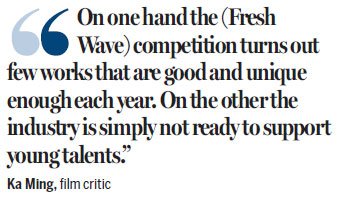Are local films ready for a Fresh Wave?
Updated: 2015-12-23 09:17
By Agnes Lu(HK Edition)
|
|||||||||
While HK's talented young filmmakers are getting recognition at film competitions, most of them are not sure when they might get a break in the film industry. Agnes Lu reports.
Johnnie To Kei-fung, one of Hong Kong's most acclaimed directors and three-time winner of the Best Director title in the Hong Kong Film Awards, was the first to applaud as the closing credits rolled on Conditioned, a short film by a college junior Chan Kam-hei.
Standing behind the audience in the back, To had watched the film quite attentively. Twenty minutes earlier, Conditioned was declared the winner of the top prize, the "Fresh Wave Award", in the local competition category of the Fresh Wave 2015 - International Short Film Festival. It also picked up two other awards.
It was the closing night of the festival, held in the Chancellor Room of the Hong Kong Convention and Exhibition Centre on Dec 20. Chan never expected to win. He had thought he was up against a strong list of contenders.
Standing on the stage with two of his crew members, Chan appeared nonplussed and a bit shy, much like the protagonist of his film. He accepted his trophy from Hou Hsiao-hsien, who was named Best Director at this year's Cannes Film Festival. Chan stammered through his acceptance speech.
He didn't think of entering the competition until the co-writer of his screenplay came to him with the story idea for Conditioned. It's about a girl who had the misfortune to be born into a family that wanted a boy. So she was raised as a boy. During her formative years, she must cope with her hysterical mother and runaway father. Chan said the idea moved him, since his own mother also has mental health issues.
Chan spent more than four months working on the screenplay after being admitted to the competition in March. It was his first cinematic effort and at 24 minutes was far longer than the two-minute-long films he made at school - the Hong Kong Academy for Performing Arts.
Shooting started in mid-July, a month-and-a-half before the submission deadline. He remembers his most challenging moments, setting the tone for the film's cinematography. He did a trial run, doing a handheld take on a scene about washing clothes. They shot the scene over and over, reviewing each time, until they made a final choice on the "look" of the film.
The final cut of Conditioned was also sent to Jimmy Choi Kam-chuen, assigned as his mentor by the Fresh Wave. Choi is a senior documentary director, who kept coming up with suggestions to improve the film, pressing Chan to set his imagination free. The film premiered at the Broadway Cinematheque and had two screenings earlier this month, with other local submissions and selected international shorts. The audience was moved by his work and the performance of Ng Wing-sze, who played the film's heroine. Some viewers said it felt like watching their own stories on screen.
Chan said he had poured his own experiences and feelings into the film. "I run away when I have to deal with my family and its problems, but I wanted my protagonist to do better than I. That's why, in the end, she stands out and confronts her pain and scars. That's my message," he said.
After viewing Conditioned, Academy Award-winning documentary filmmaker Ruby Yang, who was one of the final adjudicators at the competition, remarked, "The film tackles gender inequality and mental illness brilliantly."
Another adjudicator Shozo Ichiyama, program director of Tokyo FILMeX, commented that the film contains a strong performance of the heroine, which moves the audience. He believes this film should be ranked as the top of the lineup this year."
Enjoying the process
This year 34 young filmmakers in the open and student divisions were selected for Fresh Wave's local competition. Each entrant was to produce an original narrative short film of five to 25 minutes within six months. Each competing team was assigned a film expert as mentor and given a production subsidy of HK$70,000.
It's been 10 years since Johnnie To inaugurated the short film festival and competition. He emphasized that Fresh Wave was established to help young aspiring filmmakers to make their first films. He adds that the number of competition applicants has soared dramatically over the past decade.
Aric Lung, manager of arts promotion at the Hong Kong Arts Development Council, the government body organizing Fresh Wave, added that the event provides young filmmakers with an opportunity to give free rein to their creativity, while connecting them with the film industry at the same time. Rather than producing works with commercial potential, the competition places greater value on the process of filmmaking. The mentoring system helps motivate contestants with down-to-earth advice from beginning to end.
Tse Hei-long, who took part in the student competition, said the advice from her mentor, Alex Lai, made her script more solid and detailed. Instead of giving clear instructions on what to do, Lai, a film veteran and also a senior lecturer of film and TV directing at the Hong Kong Academy for Performing Arts, asked Tse endless questions to stimulate brainstorming, such as how she would work on giving each of her characters a unique personality.
She had around four meetings with Lai, and in the meantime kept in touch through a steady stream of e-mails. "I consider Alex's advice on my directing the most helpful. I had no experience as a director. He taught me a lot about how to manage actors, instruct them on acting, spot dispatch, etc., of which I had had no idea at all," she said, adding that she hopes to work her way up the ranks in the film industry after graduation.
Lai believes his greatest contribution was towards fine-tuning Tse's screenplay, although he wasn't quite satisfied with her film's final cut. He feels Tse could have produced a better version of the film if Tse had reached out to him earlier, well before the submission deadline. Still he admits the film turned out better than expected. Tse is a hardworking student of the cinematic art, firmly committed to becoming a film director, he said.
Limited scope
Having been a festival mentor for around four years, Lai says most of the mentees assigned to him do not seem too keen to ask questions. While Tse met with him several times, another entrant Lai was assigned to mentor this year met him only once and never spoke to him again.
When Lai entered a short film competition 20 years ago and won the award, there was no funding and he had to shoot on film. "Although nowadays we have better platforms like Fresh Wave and more advanced technology to boost creativity and production, honestly, how many young filmmakers are still left persisting in the industry and making films?" he asked.
Both Ng Chun and Law Sin-yan, competitors in the open division, admitted they reached out to their mentors only once or twice, and they felt the gains from the interactions were limited. Unlike Tse, who is keen to enter the industry, Ng and Law are more hesitant. "Usually you end up taking up an assistant's role for many years without seeing any promising future in the industry. When you finally get lucky and direct a film yourself, what are the odds that you can insist on your own ideas without yielding to commercial considerations?" asked 28-year-old Ng.
That is why film critic Ka Ming, one of the judges of Fresh Wave's qualifying round, feels even after 10 years of Fresh Wave the local film festival and competition has not made much progress in nurturing fresh talents for the city's film industry.
"On one hand the competition turns out few works that are good and unique enough each year. On the other the industry is simply not ready to support young talents," he said.
He does not think the industry will pay special attention just because someone participated in the Fresh Wave competition. It is difficult for young talents to move upward, given the industry is small, with many seniors still hanging on to the important positions. In 2014 only 51 local films were released, according to the Hong Kong Motion Picture Industry Association and the Hong Kong Theatres Association.
Cheuk Cheung, a 2009 Fresh Wave contestant, agrees. Currently a documentary director, Cheuk admitted participating in Fresh Wave did not necessarily help raise his stature in the industry. It added one more line in his CV. But most of the time film experts ignored short films, irrespective of the filmmaker's credentials.
"The real issue should be: how to let industry experts sit down, meet with us and watch our films, while we too are exposed to a wider public," he said.
Both Lai and Ka Ming feel there should be more screening and distribution channels for people to find out about Fresh Wave productions. Lai suggested more stringent selection process, so that only the truly committed and outstanding contestants are selected to produce excellent short films, which distributors might be encouraged to pick up. Ka Ming suggested the organizers reach out to cinemas for more screening programs, while exploring more avenues of online promotion and streaming at the same time. Every year each Fresh Wave submission is screened twice at the Broadway Cinematheque, usually drawing a full-house audience.
Lung says apart from cinema screenings Fresh Wave also releases a DVD compilation of all the submissions each year, organizes school screenings, and airs films on TV as well. An online screening channel will open in the future.
To admitted it was hard to organize more screenings, given the limited manpower and funding at present. He wished there could be a community screening tour around the 18 districts of the city, but then it was already satisfying for a 10-year-old film festival and competition to be the size it was now, he said.
Contact the writer at agnes@chinadailyhk.com


(HK Edition 12/23/2015 page10)